How To Boost Your Immune System With Nutrition

How To Boost Your Immune System With Nutrition
Mar 11, 2020 | By JOI team
What is the Immune System?
Given the public health concerns of a global pandemic, there has been increased awareness on the immune system and ways to maximize its function. If you remember your high school science classes, the immune system is a very complex system. It involves many organs, tissues, and cells that work together to keep us healthy and protected from infections. It does so without any instruction. And it does a beautiful job of identifying and destroying pathogens (disease-causing bacteria, virus or parasites) when we don’t even realize it is doing so. Thank you, human body!
Why Make the Immune System Stronger?
We are constantly exposed to airborne conditions, environmental toxins (even in our shampoos and cosmetics), and air pollutants that can compromise our health. So, adopting practices that help the immune system stay strong is extremely important to prevent infections and other complications. We’ve gathered the best tips on how to boost the immune system naturally, through nutrition and everyday lifestyle practices.

THE BASICS: Everyday Ways to Protect Your Immune System
- Wash your hands with soap for at least 20 seconds
- Cover your cough or sneeze with a tissue
- Avoid touching your face, especially mouth, eyes, and nose
- Limit your exposure to crowded, enclosed areas
- Wash produce thoroughly to reduce pesticide levels
- If you feel sick, stay home to prevent getting others sick
- Always have hand sanitizer within reach as a secondary way to keep your hands clean
Eat Immune-Friendly Foods
Eating a nutritious diet, rich in plant foods, is essential to fuel your immune system. Doing so also enhances your body’s ability to fight pathogens.
Different nutrients have different special powers in which they aid immunity. These special powers are due to phytochemicals, nutrients found in plant foods such as fruits and vegetables, nuts and seeds. Plant foods have health-promoting pigments that give them different colors, hence why you’ve heard many people say to “eat the rainbow.”
Because our bodies are not able to produce or store some of these nutrients, it is essential for us to consume them consistently as part of our regular diet. Here are some of the immunity superheroes:

ANTIOXIDANTS
Antioxidants do just as the name suggests. They inhibit oxidation, a natural reaction that can damage cells in the body. Oxidation produces free radicals, reactive molecules that react with cells, proteins, fats and even DNA molecules. These reactions cause damage, inflammation and disease.
Antioxidants, such as vitamin C and vitamin E, are able to terminate these harmful reactions. If the balance between free radical production and antioxidant defense is diminished, cells of the immune system are not able to perform to their best. Therefore, antioxidants are essential for maintaining and enhancing immune function. Below is a list of the best food sources of antioxidants:
VITAMIN C
- Citrus fruits (orange, grapefruit, lemon, lime)
- Kiwi, strawberries, cantaloupe, papaya, guava, pineapple*
- Bell peppers, chili peppers, broccoli, brussels sprouts, kale, tomato
- Thyme, parsley, cilantro
*Besides being a great source of vitamin C, pineapple contains the enzyme bromelain, which reduces inflammation of the nose and sinuses, and may help with expelling mucus.

SHOULD I TAKE VITAMIN C SUPPLEMENTS?
Unless you are deficient in a micronutrient (vitamin or mineral), supplementation may not be needed. When it comes to vitamin C, most of us reach for that orange-flavored effervescent tablet as soon as we sneeze (hey, we do it too). Here are some myths and facts about the role of vitamin C supplementation in infections and the common cold.
MYTH: Vitamin C supplementation helps prevent the common cold in the general population.
FACT: Studies have found vitamin C to prevent colds in highly active individuals, such as marathon runners and soldiers, but the same was not found for the general population. Furthermore, Vitamin C supplementation may reduce the duration and severity of symptoms after the onset of a cold. (Review of studies here).
MYTH: Vitamin C is more bioavailable (more absorbable) when taken in the form of supplements.
FACT: Studies suggest the availability of vitamin C from supplements versus food sources to be equivalent. However, dietary vitamin C is the preferred method over supplementation. This is because vitamin C-rich foods provide additional health benefits (fiber, vitamins and minerals). Plus, foods provide a more balanced dose of nutrients that prevent over-consumption of a vitamin. In contrast, supplements may lead to too much of a good thing (yes, there is such a thing).

VITAMIN E
- Almonds (one of the best sources of vitamin E; you’ll find lots of it in JOI)
- Peanuts, peanut butter
- Sunflower seeds, sunflower oil
- Spinach, broccoli, tomato
MINERALS
Minerals such as zinc, selenium, and copper, are key players in keeping the immune system in check, as many studies have suggested. That’s because they function as cofactors in hundreds of reactions in the body, including those involving immune cells.
Some minerals also act as signal molecules (messengers) for immune cells, helping them better communicate with one another and work together.
Other minerals are able to stimulate the protective function of cells.
Minerals can also function as antioxidants and may even improve the responses of antibodies (proteins that attach to virus and bacteria to label them as invaders).
Below are the best plant-based sources of immune-helping minerals:
ZINC
- Cashews and almonds (JOI to the rescue!)
- Spinach, asparagus, mushrooms
- Pumpkin and sesame seeds
- Lentils, chickpeas, kidney beans, peas
SELENIUM
- Brazil nuts and cashews
- Whole wheat bread, brown rice, oats
- Baked beans, lentils
- Bananas, peaches
COPPER
- Cashews
- Potatoes, avocado, spinach, mushrooms*
- Tofu, chickpeas
- Sunflower and sesame seeds
*Mushrooms contain beta-glucans, a type of soluble fiber known to increase immune defence by enhancing the ability of immune cells to engulf and destroy pathogens.

ANTIMICROBIALS
We’re not telling you to ditch your antibiotics, but these antimicrobial and antibacterial foods contain natural pathogen-fighting benefits and can offer immune protection to help your body fight enemies.
These foods include mostly herbs and spices that you can easily add to your cooking routine to season and add flavor to your foods!
- Cinnamon
- Garlic
- Onion
- Ginger
- Turmeric
- Manuka honey
- Echinacea (can be taken as a supplement or as a tea)
ANTI-INFLAMMATORIES
Inflammation is the body’s natural response to infections or injuries. When your body becomes infected with a foreign substance, cells of the immune system travel to the site of infection to fight the problem. This causes an inflammatory response (which we see as redness, swelling, and pain). It’s our body’s way of letting the immune system know it’s time to defend itself against invaders.
However, when inflammation is prolonged, it becomes problematic. Inflammation is linked to chronic diseases and autoimmune disorders. So, if you’re wondering how you can reduce inflammation, here’s a list of powerful foods to eat:
- Almonds (yay we love them!)
- Walnuts
- Green tea (rich in polyphenols; functions as both antioxidant and antimicrobial!)
- Turmeric (thanks to its active ingredient curcumin)
- Ginger
- Garlic
- Berries (strawberries, blueberries, raspberries, blackberries)
- Broccoli
- Avocado
- Tomatoes
ANYTHING ELSE I CAN DO?
Besides keeping your hands and your surroundings clean, eating a nutritious diet, and staying hydrated, there are a few other healthy habits you can implement into your routine to set yourself for success.
-
Sleep: Research shows that adequate sleep improves the efficacy of the immune system. That’s because during sleep, our body releases cytokines. Cytokines are proteins that assist the communication between cells of the immune system. They ensure that the cells of the immune system can work together to fight infection.
General guidelines for adults recommend 7-9 hours of sleep every night.
Tips to get better sleep include limiting TV or phone screens at night, having a quiet and dark environment, and doing breathing techniques at bedtime.
-
Exercise: Physical activity stimulates blood flow. Proper blood circulation allows the cells of the immune system to get to where they need to be and work more efficiently.
Moderate exercise (at least 30 minutes daily) has been shown to improve the traveling time of immune cells toward the affected areas, increasing their protective activity.
-
Keep calm: Stress can reduce the number of white blood cells in the body. White blood cells are those that fight infections (kind of important here).
Adopting mindful practices such as meditation, yoga, and breathing techniques can help reduce every-day stress and therefore keep white blood cell numbers optimal.
-
Limit consumption of:
Alcohol, highly processed foods, added sugars, and saturated fats.
These have been found to increase inflammation and reduce the efficacy of the immune system when trying to identify and destroy unwanted visitors.

JOI IMMUNITY BOOSTER
Feeling under the weather? Here’s JOI’s wellness shot with immune-boosting ingredients to give your body a little extra encouragement to fight infections. Consume it once a day as part of a healthful diet. For best absorption, take it in the morning before eating breakfast.
By Carolina Schneider, MS, RD (@thegreenrd)
Originally from Brazil, Carolina moved to Florida in 2010 to complete her bachelor’s degree in Public Relations and Journalism, followed by a Master of Science in Nutrition & Dietetics. Carolina recently relocated to New York City to pursue her career as a dietitian in the health food industry. She is a Nutrition Consultant for JOI and one of our biggest fans! Carolina believes in the power of a whole-food, plant-based diet combined with physical activity for optimal health. Her favorite foods are dark chocolate and broccoli (preferably not together), and her favorite JOI recipe is the Golden Milk!





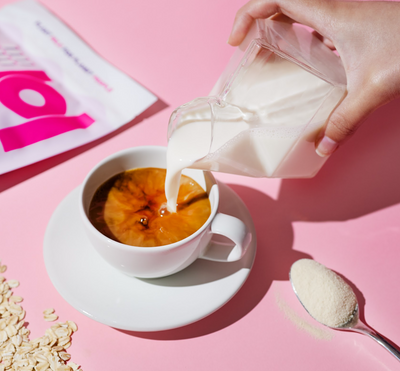
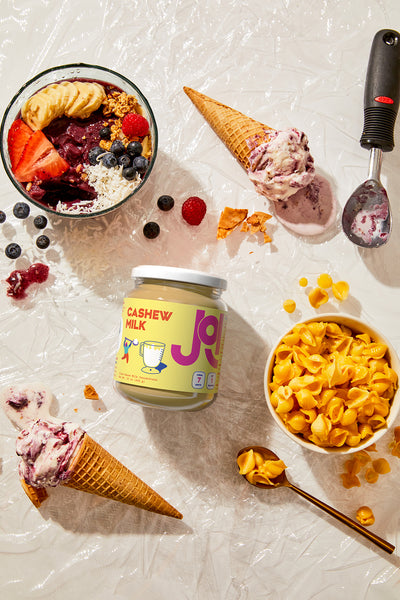
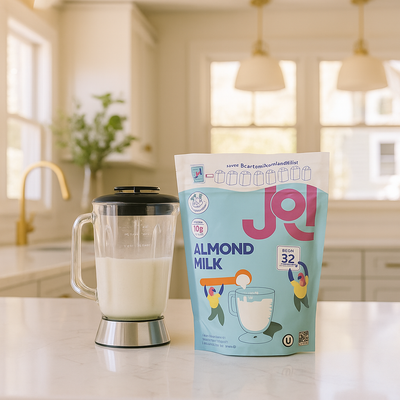
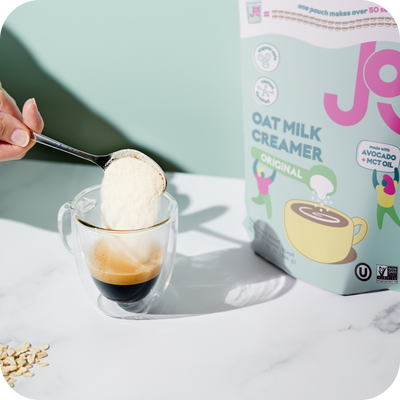
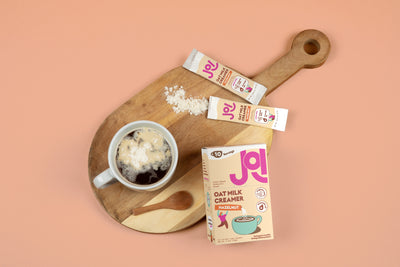
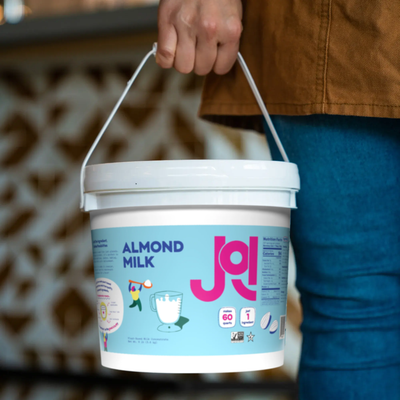
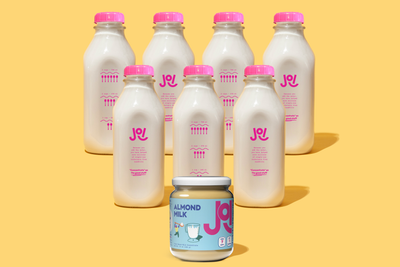
 CHECKOUT
CHECKOUT